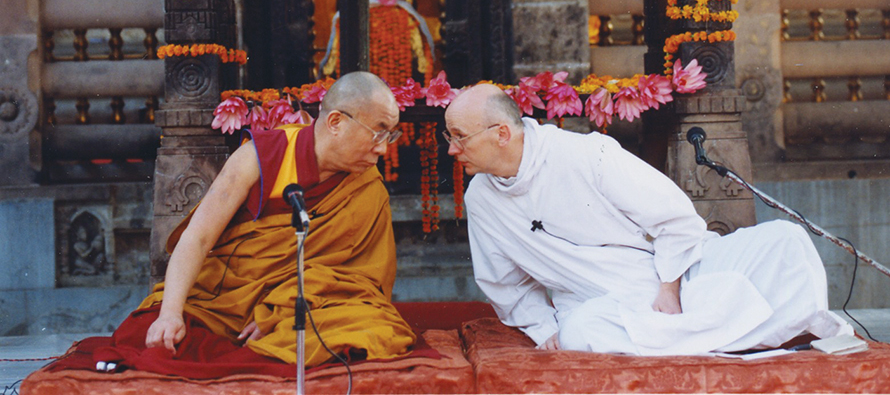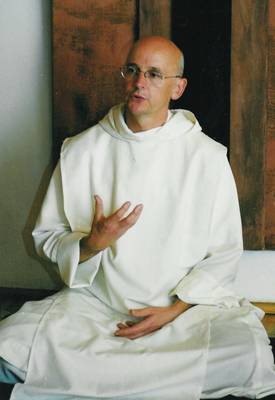What being a priest means to me

Image: FATHER LAURENCE Freeman and the Dalai Lama, spiritual leader of Tibet, take part in a dialogue during an initiative hosted by the World Community for Christian Meditation.
MY OWN VOCATION, once it emerged, was always to the monastic life centered in the practice of contemplation. It was a tremendous grace for me to have been influenced and guided by one of the great spiritual figures of the 20th century, the Benedictine monk Father John Main, O.S.B. I first met him when I was still at school and had no idea or attraction of doing anything in life except becoming a famous, successful writer and, hopefully, a rich one.
At university I studied literature. Planning to do postgraduate studies later, I decided to get off the academic train for a year or two and have a taste of the real world. I taught, traveled, made an entry into journalism, and even, just to do something against my own grain, went into merchant banking despite being useless at math. I cannot be held responsible for the current meltdown of the capitalist system because I could only endure the banking world for a year.
|
An interfaith perspective on priesthood can help discerners find their true vocation. The Christian priesthood is not a caste or sect as in other religions—not a shaman (as in indigenous religions) nor a Brahmin (as in Hinduism) nor a Levite (as in ancient Judaism). Christian priests come from among the people they serve and not from a separate caste or sect. The understanding that the people of God share in the priesthood of Christ is sometimes underemphasized in the Roman Catholic Church, in which ministerial priesthood is reserved for celibate men. Other ways of being a Christian priest are found in the great traditions of Eastern Orthodoxy (married priests) and Anglicanism (ordained women). Roman Catholic discerners might gain a more in-depth understanding of their own tradition—and their place within it—by studying others. —Father Laurence Freeman, O.S.B |
Nevertheless it taught me very clearly what I did not want to pursue and awakened me to the reality of my spiritual search. It is amazing how this search can exist in young people without their adequately recognizing it. Sometimes it seems too scary to face. Sometimes we just don’t know what it is.
Try something radical
That’s why I would advise anyone seeking their vocation to take a year off and do something out of the ordinary, preferably out of character. Talking with counselors and vocation directors is helpful—up to a point. But the real teacher is “Christ within you,” as Saint Paul says. And nothing puts you better into touch with that interiority than stepping out of the predictable. After all, if you are going to do something as radical as following a religious vocation, it would be wise to test how radical you really want to be and allow the process of conversion a chance to begin.
During this time in my own life, Father Main started a lay community at his monastery in England to teach and practice Christian meditation. I felt attracted to experience that for six months and hoped it would help me get my spiritual discipline into better shape, learn to meditate, and then set off well-prepared to conquer the world
At the end of the six months I realized I was in a double bind. I had lost my worldly ambition (though not, unfortunately, my other faults), but also I did not want to become a monk, at least not yet. John Main walked along the path of my confusion with me but never exerted any pressure that would make the discernment less liberating.It was a hard but wonderful time of growth in self-knowledge, which I came to realize is the real meaning of humility. Any vocation has to humble us. We see its beauty and greatness in the context of our own pride and weakness. This humbling, through prayer and, ideally, life with others, is especially important for those discerning a call to priesthood or religious life, which are great vocations but also dangerous ones. Why dangerous? Pride, elitism, loneliness, power—for every great vocation there is the danger of hijacking by the ego.
When, as young (or older) people, we struggle with our life decisions, we should realize what a rare time of grace it is to be in this in-between state. In fact it is the ideal state to be in for contemplative prayer because we are detached and as yet undistracted by the details and ego-traps of our work. It is rare we see this at the time, but a good counselor will save us from being impatient and making a premature decision simply because we feel insecure or unconventional. A choice made because we are frightened or want to look good in the eyes of others is rarely a vocation.
| FATHER LAURENCE Freeman, O.S.B. focuses his priestly ministry on sharing Christian meditation practices with people throughout the world. |
A leap into the dark—then peace
I went off on a pilgrimage and, a little romantically, walked up the steep hill of Montecassino, site of Saint Benedict’s first monastery. Romanticism usually suffers disillusion and I was shocked to see how like Disneyworld the monastery was—it had been artificially recreated after being bombed to nothing in 1945. Strangely, that disappointment helped me to be more real, and I took the decision to enter the novitiate. It seemed as if it were a leap in the dark, but once I had made it, an unexpected and abiding peace visited me as did an ability to trust the subtler movements of the Spirit that I had not known before.
What about the priesthood? As a monk, priesthood for me is in a sense a secondary or complementary vocation, while at the same time the gift of celebrating the Eucharist has a more and more profound identity at the center of my identity. Perhaps it is better to say that as part of the church I feel I am a monk who also received the unexpected bonus of ordained priesthood, which opens up more dimensions of the mystery of my vocation in Christ.
Early in my monastic training I was led to go with John Main to start a new kind of monastic community, based in the practice and for the teaching of meditation. We were invited by an archbishop and had the support of our monastic brethren, but it was a radical new beginning and a great simplification of my life. As the community was small and the demands on it increased, priesthood became for me essentially a way of serving the needs of my community and its visitors. That meant above all celebrating Mass for the community and our visitors.
The need for contemplation
Mine was a different approach to priesthood than for someone drawn to a vocation to the diocesan vocation priesthood. But the essential dynamic of Christian priesthood is always one of ministry, above all Eucharistic ministry, to the people of God who themselves share in the priesthood of Christ.I was very moved talking to a recently ordained Catholic priest. He spoke of how his vocation had been awakened as a young boy when his father took him to a soup kitchen. From that moment he felt called to serve the poor, and priesthood appeared as the way he felt he could do that best.
| What’s the difference between a monk and a priest? Monk: A member of a monastic religious community, that is, a community whose life is centered on prayer, including regularly praying the Divine Office: a prescribed set of psalms, readings, and prayers. Priest: An ordained minister who presides at Mass and administers the other sacraments. Priests can be diocesan, primarily ministering in parishes and accountable to a bishop, or they can be members of religious communities, including monastic communities, and accountable to the elected community superior. Religious-community priests minister in a variety of settings. |
My own calling has led me to share the importance of contemplation with people throughout the world. I recently led a contemplative retreat for diocesan priests. We all came to believe that a practice of contemplative prayer is a necessity for any priest, especially one trying to live a celibate life. The depth of intimacy of daily meditation helps transform sexual and emotional loneliness into a sense of universal connectedness in Christ, which is the meaning of solitude.
It is not easy to start such a regular contemplative practice after ordination—though many do. Far wiser, however, is to begin to pray at the level of the heart as soon as your discernment process begins and to lay the foundations strongly during the years of formation. In my experience nothing teaches better that Christ is the one priest and calls all his followers to share in his priesthood in wondrously diverse ways of service.
Tags
Related
- Taking a chance on God: Profile of Father David Gutierrez, C.M.F.
- About-face to the priesthood
- Moved by the power of the Eucharist: Profile of Father Duy Henry Bui Nguyen, S.C.J.
- No regrets: A grateful priest takes stock
- We’re different—in a good way: Profile of Father Roberto Mejia, O.Carm.
- Man with a mission
- Monastic life is habit-forming
- Ministering to migrants in a carport cathedral
- Connections make the man: Profile of Father Kevin Zubel, C.Ss.R.
- A priest (who’s been there) responds to the pain of addiction Read More
Most Viewed
- Find your spirituality type quiz
- Questions and answers about religious vocations
- Celibacy quiz: Could I be a nun? Could I be a brother? Could I be a priest?
- Resources for older discerners or those with physical and developmental differences
- About Vocation Network and VISION Guide



 Father Laurence Freeman, O.S.B. belongs to the Benedictine community of Monte Oliveto, Italy. Born and raised in England, he now lives there again as director of the World Community for Christian Meditation. In addition he is founder and director of the John Main Center for Meditation and Interfaith Dialogue at Georgetown University in Washington, D.C.
Father Laurence Freeman, O.S.B. belongs to the Benedictine community of Monte Oliveto, Italy. Born and raised in England, he now lives there again as director of the World Community for Christian Meditation. In addition he is founder and director of the John Main Center for Meditation and Interfaith Dialogue at Georgetown University in Washington, D.C.